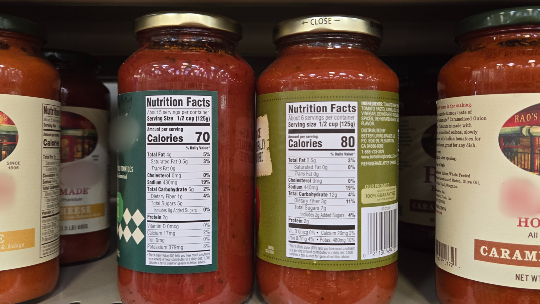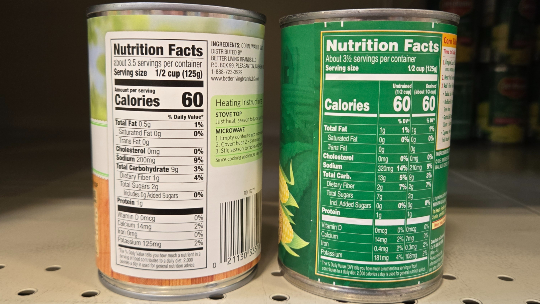You’re standing in the pasta sauce aisle of your favorite grocery store. You reach for your favorite brand of sauce. Then, you notice a different sauce below that’s a few dollars cheaper. It’s the store brand sauce. What do you do?

Brand name pasta sauce on the left, store brand on the right.
If you’re trying to save money, you may consider the store brand, also referred to as “generic” or “off-brand.” But before you make any decisions, it’s important to understand the nutritional impact your choice may have. We talked to August Espinal, HMSA manager of Condition Care Programs and a registered dietitian, to see if there are nutritional benefits to buying brand-name food.
The rise of generic
Inflation is rising. The economy is recovering from a recession. There’s a demand for less costly items. Though this may describe our present-day situation, we’re actually talking about the 1970s. According to Live Healthy Live Well, “Generic food brands, introduced in 1977, were sold in white packaging with black lettering and considered inferior to brand-name products.”
Today, many stores have their own “private label,” which is just a fancy name for “store brand.” According to Forbes, “Over 87% of consumers are opting for private label items to save money.” But how does the private label compare to their brand-name counterparts? The answer: It depends.
Label literacy
As a registered dietitian, Espinal wants to emphasize the importance of reading and understanding nutritional labels on food. “When comparing two products, it’s important to check the food labels to see if there’s any difference in nutrients that may impact your health conditions,” she says. “For example, does one product have more saturated fat or sodium, or less fiber?”

Store brand corn on the left, brand name corn on the right. Practically identical!
If you have food allergies, Espinal recommends reviewing the ingredients list each time you’re about to buy it. Sometimes ingredients and manufacturing processes can change without warning, so it’s best to make reading and understanding labels a habit to avoid potential allergens.
Changing perceptions
As sensible consumers, we’re inclined to believe that we get what we pay for. However, it doesn’t hurt to consider less costly options when it comes to food. “There may be a perception that you have to pay more for higher quality,” Espinal says. “I think there’s been more acceptance of generic and store brands as they’ve become more available in big box and discount wholesale stores.”
According to the Private Label Manufacturers Association, “One of every five food or non-food grocery products sold in outlets across the U.S. carries the retailer’s name or own brand and was supplied by a store brand manufacturer.” And some stores are believed to work with well-known companies to produce their signature products.
Choose your own (food) adventure
While everyone has an opinion about whether they prefer brand-name over store brand food due to factors such as taste, nutrition, and price, it’s up to each person to see what works for them. “With rising food prices, there are many ways to still choose healthful foods on a budget,” Espinal says. “Store brand or generic brands can save you 25% to 30% and help stretch your food budget. Try the products for yourself and see what your preference is.”
Feeling hungry?
Whether you use name brand or private label ingredients in these islandscene.com recipes, they’re sure to turn out delicious!




